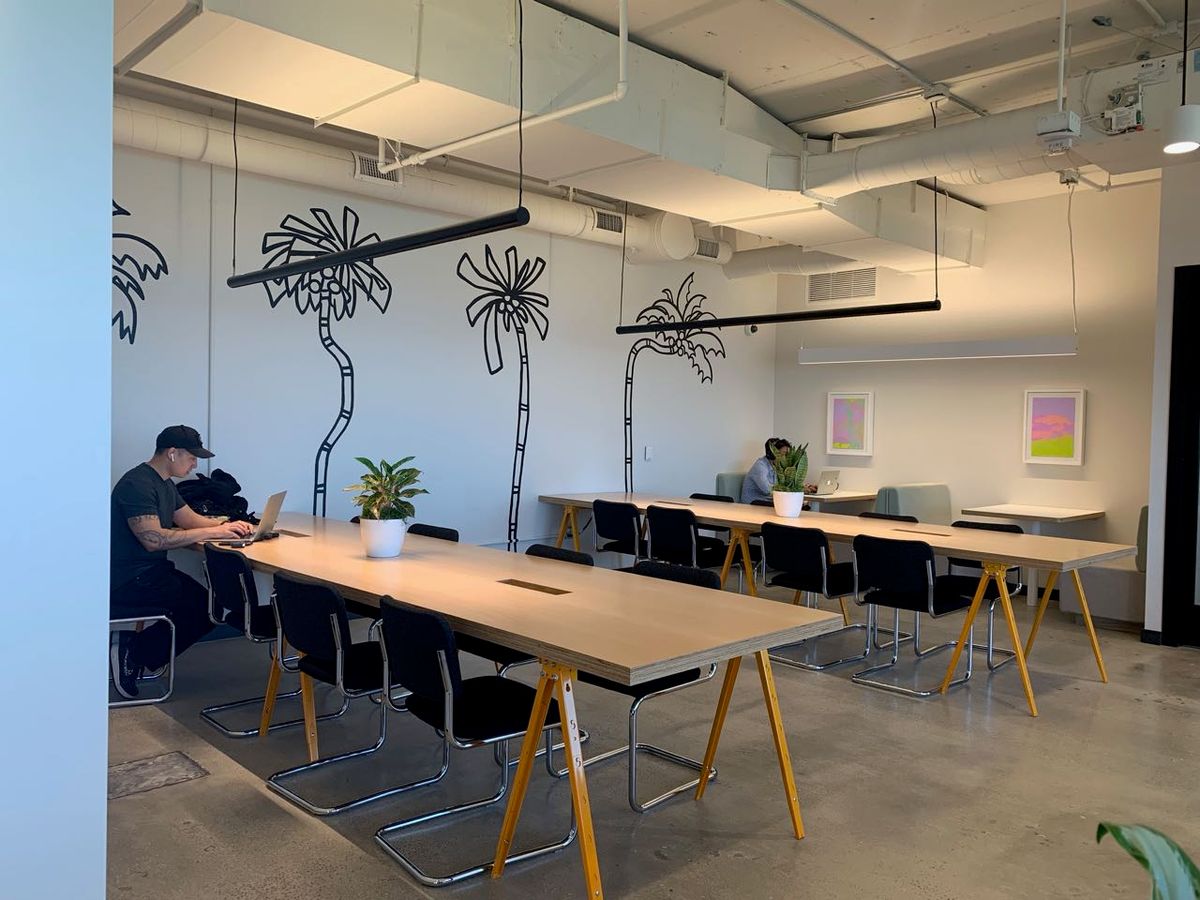In the dynamic landscape of co-working spaces, the integration of Artificial Intelligence (AI) is revolutionizing the way customer support is delivered. AI customer support agents are not just transforming the efficiency of service delivery but are also playing a pivotal role in fostering thriving collaborative communities within these spaces. As AI takes on routine tasks and provides intelligent insights, it enables a more connected and innovative environment where members can focus on growth and collaboration.
Key Takeaways
- AI customer support agents in co-working spaces streamline booking processes, provide essential information swiftly, and help facilitate networking among members, thereby enhancing the collaborative atmosphere.
- Educating teams on AI capabilities and sharing success stories encourages the adoption of AI as a collaborative tool, fostering a culture of continuous learning and skill development.
- The synergy between human creativity and AI efficiency in co-working spaces leads to proactive problem-solving, predictive maintenance, and the formation of high-performing teams ready for the future of work.
- AI's role in customer support elevates client satisfaction by acting as the first point of contact and assisting human agents in delivering personalized service and fostering innovation.
- Integrating AI helpdesks into the employee support ecosystem contributes to a seamless workflow, encourages regular feedback for improvement, and significantly boosts efficiency and productivity.
Revolutionizing Co-Working Spaces with AI Support

Streamlining Booking and Information Queries
In the dynamic world of co-working spaces, AI customer support agents are revolutionizing the way bookings and information queries are handled. By automating routine tasks, these intelligent systems enable members to reserve spaces and access information with unprecedented ease and speed.
- Instantaneous response to common queries, such as availability of meeting rooms or event schedules.
- Simplified booking process with AI-guided assistance, reducing the need for manual intervention.
- Real-time updates and notifications to keep members informed about their bookings and changes.
The integration of AI into these processes not only enhances efficiency but also allows community managers to focus on more strategic tasks that foster a thriving collaborative environment.
The impact of AI on streamlining operations is evident in the reduction of wait times and the elimination of potential human errors. This seamless interaction between members and the co-working space cultivates a more productive and satisfying experience.
Facilitating Networking and Community Building
In the dynamic landscape of co-working spaces, AI customer support agents are becoming pivotal in fostering networking and community building. AI-driven platforms enable members to connect based on shared interests, skills, and professional goals, creating a rich tapestry of collaborative opportunities.
- AI tools curate events and workshops tailored to member preferences.
- Smart matching algorithms suggest potential collaborations.
- Real-time communication channels are facilitated by AI for seamless interaction.
By leveraging AI, co-working spaces can orchestrate a symphony of connections that not only enhance the professional network of individuals but also weave a stronger community fabric.
The impact of AI on networking is not just about facilitating connections; it's about nurturing a community that thrives on mutual support and growth. With AI's assistance, co-working spaces can transform into hubs of innovation where every member feels valued and empowered to contribute.
Enhancing the Member Experience with AI Integration
In the dynamic landscape of co-working spaces, AI integration is pivotal in enhancing the member experience. By leveraging AI, members enjoy tech-driven flexibility and a more personalized interaction with the space. AI-powered systems can offer targeted recommendations based on user preferences, significantly improving the relevance and resonance of the services provided.
- Improved user experience with context-aware interactions: AI maintains context across conversations, leading to more coherent and seamless interactions. This reduces the need for members to repeat information, thus elevating their overall experience.
The smarter the AI, the better the user experience. As AI platforms evolve, they learn from interactions and provide more personalized responses, fostering a sense of understanding and value among members.
Assessing the integration capabilities of AI helpdesks is crucial. A successful AI platform must integrate seamlessly with existing IT infrastructure, ensuring a unified and efficient support experience. Compatibility with current systems and API support for custom integrations are essential for a smooth operation.
Empowering Teams with AI: A Growth and Learning Opportunity

Training on AI Features for Skill Enhancement
In the rapidly evolving landscape of co-working spaces, upskilling and reskilling are crucial for staying ahead. Training on AI features not only enhances the team's technical capabilities but also fosters a culture of continuous learning and growth.
- Bridging the Skills Gap: AI is transforming workflows and introducing new job requirements. Training programs are essential to prepare employees for the AI-integrated workplace.
- Empowering for the Future: Focusing on critical thinking and problem-solving equips employees for collaboration with AI and adapting to technological changes.
- Boosting Innovation and Creativity: While AI handles automation, human creativity remains irreplaceable. Training that emphasizes these human skills can provide a competitive edge.
By integrating AI training into the professional development of employees, co-working spaces can ensure that their teams are not just equipped to use the latest technology but are also primed to innovate and lead in their respective fields.
Consider peer-led training programs or micro-learning opportunities to accommodate different learning styles and schedules. These initiatives can create a supportive learning environment and make training more accessible, ultimately enhancing the overall member experience in co-working spaces.
Sharing Success Stories to Inspire Adoption
The journey of integrating AI into co-working spaces is enriched by the sharing of success stories that highlight the transformative impact of AI support agents. These narratives serve as powerful testimonials, encouraging others to embrace the technology and explore its potential.
- Increased Engagement: Members who interact with AI report a more personalized experience.
- Efficiency Gains: Teams using AI for scheduling and queries save significant time.
- Community Growth: AI-facilitated connections lead to a stronger sense of community.
By showcasing real-world examples of AI's positive influence, we not only demystify the technology but also demonstrate its tangible benefits in fostering collaboration and efficiency.
It's crucial to remember that these stories are not just about the technology itself, but about the people it serves and the communities it helps to build. The shared experiences act as a beacon, guiding others towards a more innovative and interconnected future.
Positioning AI as a Collaborative Team Player
In the evolving landscape of co-working spaces, AI is not just a tool but a team player, enhancing the capabilities of human colleagues. By integrating AI into daily operations, employees can focus on creative and interpersonal tasks, while AI handles data-heavy activities.
AI's role extends beyond mere automation; it's about augmenting human skills and enabling a more dynamic workflow.
To ensure AI is seen as a collaborative force, consider the following steps:
- Encourage open dialogue about AI's role and potential within the team.
- Provide training sessions to familiarize employees with AI functionalities.
- Share examples of AI-driven successes to illustrate its supportive role.
- Foster a culture where AI and human input are both valued in decision-making.
By embracing these practices, co-working spaces can cultivate an environment where AI and humans work in synergy, driving innovation and productivity.
The Synergy of Human-AI Collaboration in Co-Working Environments

Combining Human Creativity with AI Efficiency
In the dynamic landscape of co-working spaces, the fusion of human creativity with AI efficiency is not just an advantage; it's a necessity. Humans bring to the table their innate ability to think strategically, solve complex problems, and innovate. AI complements these strengths with its capacity for rapid data processing, accuracy, and automation. This synergy enables teams to not only generate innovative solutions but also to make informed, data-driven decisions.
By harnessing the collective strengths of humans and AI, organizations are setting the stage for unprecedented breakthroughs and success.
The integration of AI into co-working environments requires a thoughtful approach. It's about empowering employees to leverage AI capabilities, thereby enhancing their own productivity and creativity. The table below illustrates the complementary roles of humans and AI in a co-working space:
To ensure a seamless human-AI partnership, it's crucial to address the challenges of integrating generative AI into human workflows. This may involve redesigning processes and fostering a culture that values employee input on AI's role in their work. The future of work is not about choosing between human or AI, but rather embracing the potential of human and AI collaboration.
Proactive Issue Prevention with Predictive AI
In the dynamic world of co-working spaces, predictive AI is a game-changer for proactive issue prevention. By leveraging historical data and user behavior, AI systems can anticipate and resolve potential issues before they escalate, ensuring a seamless experience for all members.
- Optimized workflows: AI predictive analytics streamline operations by efficiently allocating resources and reducing response times.
- Enhanced user experience: Anticipating IT issues before they impact users leads to increased satisfaction and minimal downtime.
Predictive AI not only fortifies IT helpdesks but also serves as a strategic asset in maintaining operational excellence.
Choosing the right AI tools for risk management and incident response is becoming increasingly important. These tools enable continuous monitoring and proactive risk assessments, which are crucial for maintaining a secure and reliable co-working environment.
Building High-Performing Teams for the Future of Work
The future of work is a harmonious blend of human ingenuity and AI's analytical prowess. By strategically integrating AI into workflows, teams can unlock unprecedented levels of efficiency and creativity. This synergy not only enhances productivity but also fosters a culture of innovation where both humans and AI contribute their best.
The key to success in this new era is to view AI as a powerful collaborator, not a replacement. Embracing AI tools allows teams to focus on complex, creative tasks while AI handles routine, data-intensive work.
To ensure a smooth transition into AI-enhanced workflows, consider the following steps:
- Encourage employee input on AI integration
- Bridge the skills gap with targeted training
- Foster a human-centered work environment
- Leverage AI for predictive analytics and proactive problem-solving
By reimagining teamwork with an AI-powered collaboration platform, organizations can create new opportunities and build high-performing teams ready for the challenges and opportunities that lie ahead.
Elevating Customer Support: AI's Role in Client Satisfaction and Innovation

AI Chatbots as the First Line of Customer Interaction
In the dynamic landscape of co-working spaces, AI chatbots have become the cornerstone of customer interaction, offering a blend of efficiency and personalization. These sophisticated tools are equipped with natural language processing and machine learning, enabling them to provide immediate and accurate responses to common inquiries. This not only streamlines the support process but also enhances the overall customer experience.
- Boosting Client Satisfaction: AI chatbots effectively handle routine questions, allowing human agents to concentrate on more complex and nuanced customer needs. This division of labor ensures that each interaction is managed by the most suitable resource, optimizing satisfaction levels.
- Fueling Innovation: By sifting through extensive data, AI chatbots contribute to creative problem-solving, suggesting innovative approaches to customer support challenges.
The integration of AI chatbots is a strategic move that not only augments the efficiency of customer support but also acts as a catalyst for innovation within the co-working community.
The deployment of AI chatbots across various platforms, including Slack and Microsoft Teams, ensures a seamless omnichannel presence. This ubiquity allows for consistent support experiences, regardless of the chosen communication channel. As these AI systems evolve, they become more adept at resolving a higher percentage of issues autonomously, leading to reduced manual workload and increased employee contentment.
Humanizing Customer Service with AI Assistance
In the realm of customer service, AI assistance is not just about efficiency; it's about adding a human touch to digital interactions. AI-powered chatbots, equipped with natural language processing, are now capable of understanding and responding to customer needs with a level of personalization that rivals human agents. This shift towards empathetic AI is transforming the customer support paradigm, making every interaction feel more genuine and less transactional.
By leveraging machine learning, AI systems can analyze customer sentiment, adapt their responses accordingly, and even anticipate needs before they are explicitly stated. This proactive approach ensures that customers feel heard and valued, fostering a sense of community within the co-working space.
The integration of AI into customer service also includes:
- A seamless handoff to human agents when complex issues arise, ensuring a smooth customer experience.
- Continuous learning from interactions to refine the AI's understanding of customer preferences and behaviors.
- The ability to provide support across various communication channels, meeting customers where they are most comfortable.
Leveraging AI for Creative Problem-Solving and Innovation
In the dynamic landscape of co-working spaces, AI is not just a tool for efficiency but a catalyst for innovation. By identifying patterns, AI can spark new ideas and innovative solutions, enabling human employees to build upon these insights and develop groundbreaking concepts that propel the business forward.
- Human Ingenuity Meets Machine Efficiency: Combining human creativity with AI's analytical prowess leads to innovative solutions and data-driven decisions.
- The Democratization of Innovation: AI's accessibility allows employees across disciplines to experiment and contribute to a culture of innovation.
- Boosting Innovation and Creativity: Training on AI features enhances uniquely human skills, unlocking a competitive advantage.
AI's role in co-working spaces transcends traditional support; it's about equipping teams with the tools to innovate and create the future of work. As AI takes over routine tasks, the human capacity for creativity becomes even more critical, ensuring that co-working spaces remain hubs of innovation and collaboration.
Integrating AI Helpdesks into the Employee Support Ecosystem

Seamless Workflow Integration for a Unified Support Experience
Integrating AI helpdesks into co-working spaces is not just about adopting new technology; it's about creating a seamless support experience that aligns with existing workflows. By integrating with platforms like Slack or Microsoft Teams, AI helpdesks become a natural extension of the daily tools employees already use, ensuring minimal disruption and maximum adoption.
- with existing systems: AI helpdesks integrate with other systems, databases, and communication platforms.
- Customization: Tailoring the AI to fit unique processes and workflows enhances personalization.
- Knowledge base access: A comprehensive knowledge base empowers self-service and reduces ticket volumes.
The integration of AI helpdesks streamlines support operations, from password management to IT service management, and automates repetitive tasks. This not only reduces manual workloads but also elevates the overall support experience for both customers and employees.
The table below illustrates the impact of AI helpdesk integration on support efficiency:
By embracing AI helpdesks, co-working spaces can offer a more responsive, efficient, and personalized support system that benefits everyone in the community.
Regular Feedback Loops for Continuous AI Improvement
The integration of AI into co-working spaces is not a one-time event but a continuous journey of enhancement and refinement. Regular feedback loops are crucial for the AI's evolution, ensuring that it adapts to the dynamic needs of the workspace and its members. By establishing clear channels for feedback, employees become active participants in the AI's development, contributing to a system that truly understands and assists in their daily tasks.
Feedback mechanisms serve as the backbone for AI improvement, allowing for the identification of biases, inaccuracies, and areas that require enhancement. This ongoing evaluation is essential for maintaining the integrity and utility of AI systems. For instance, AI-powered assessment tools can provide real-time feedback on performance, leading to targeted improvements and a more personalized support experience.
Embracing a culture of continuous learning and improvement, co-working spaces can leverage AI to not only respond to current challenges but also anticipate future needs. This proactive approach fosters a collaborative environment where technology and human expertise grow in tandem.
The Benefits of AI Helpdesks: Efficiency and Productivity
AI helpdesks are revolutionizing the way co-working spaces operate, offering unparalleled efficiency and productivity gains. By automating routine tasks, these systems enable human support agents to concentrate on more complex and strategic work, enhancing the overall member experience.
The integration of AI helpdesks into the support ecosystem has led to a significant reduction in the time spent on high-volume, low-value service desk activities. This allows for round-the-clock assistance and streamlined incident routing, which are crucial in today's always-on, work-from-anywhere culture.
The adoption of AI helpdesks is not just about improving workflows; it's about transforming the co-working space into a more dynamic and responsive environment.
Here's a quick look at the tangible benefits that AI helpdesks bring to the table:
- Increased productivity: Human agents are freed to focus on complex issues and strategic projects.
- Faster and efficient issue resolution: Automation leads to quicker resolutions and reduced wait times.
- 24/7 availability: Continuous support regardless of time zones or working hours.
- Cost savings: Reduced workload on human agents translates to financial benefits.
These benefits collectively contribute to a more satisfying work environment, which can have a positive impact on employee satisfaction and retention.
Conclusion: Embracing AI for a Collaborative and Efficient Future
As we navigate the evolving landscape of co-working spaces, the integration of AI customer support agents stands out as a transformative force. These digital assistants not only streamline operational tasks such as managing bookings and providing information on amenities but also play a pivotal role in fostering a thriving community by facilitating networking opportunities. By embracing AI, co-working spaces can enhance the collaborative spirit, allowing members to focus on innovation and growth. The future of co-working is not a choice between human or AI, but a synergy of both, working in concert to create a more dynamic, supportive, and successful environment for all.
Frequently Asked Questions
How do AI customer support agents enhance the co-working space experience?
AI customer support agents manage booking inquiries, provide information on amenities, and facilitate networking opportunities, thereby streamlining operations and enhancing the collaborative community within co-working spaces.
What are the benefits of training teams on AI features in co-working environments?
Training on AI features helps enhance team members' skill sets and career trajectories, encourages the adoption of new technologies, and positions AI as a collaborative tool that grows alongside the human team.
How is AI reshaping the future of employee support in co-working spaces?
AI is automating mundane tasks, delivering fast responses, and fostering a culture of innovation, which collectively enhance the support experience and prepare teams for the evolving demands of the workplace.
What role does AI play in client satisfaction within co-working communities?
AI-powered chatbots handle basic inquiries, allowing human agents to focus on complex issues and personalized interactions, which improves client satisfaction and strengthens client relationships.
How does AI integration benefit the workflow and productivity of co-working space teams?
AI integration streamlines workflows, provides quick and accurate solutions to support inquiries, and allows team members to focus on strategic tasks, thereby boosting overall productivity.
How does the integration of AI helpdesks into co-working spaces contribute to proactive issue prevention?
AI algorithms analyze historical data to predict potential problems, enabling proactive issue prevention and allowing helpdesk teams to address needs before they arise, contributing to operational excellence.



